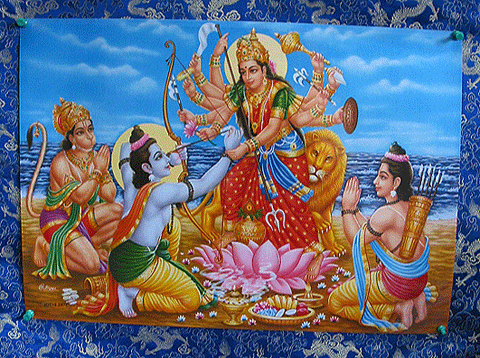
Buddhism and Hinduism share what is roughly a parent and child relationship, and though the basic religious tenets of both are similar, there are a few striking differences between the two.
Unlike the Abrahamic family of religions, Buddhism and Hinduism have always been able to coexist peacefully, albeit, at times it was a strained peace. Hinduism doesn’t bother having long theological battles with other religions, instead they find what they like and incorporate it into their belief system. This is a very old Hindu tradition that can trace its roots to the ancient Rig Veda, that claimed the truth is one; sages call it by different names. In other words, every religion is valid because it promotes virtue and spirituality, and for a Hindu, that is enough.
Sometimes during the first century Buddha was declared an incarnation of Vishnu and modern Hindus accept this proclamation. Throughout history Buddhism and Hinduism have influenced each other and helped each other change. Though there were a few instances of when Buddhist princes or Hindu princes persecuted one another, these occurences were very rare and were never violent.
![]()
One of the primary reasons that Buddhism first gained acceptance in India was its denunciation of the caste system, which is one of the most sacred and long-held Hindu traditions. While Hindus accept the Vedas as authoritative texts to live by, Buddhists have no books whose word is law. Though there is a great deal of Buddhist literature, they do not have a text that they are obliged to obey regardless of the circumstances. This perhaps goes back to the notion that Buddhism in general is simpler than Hinduism, because in essence Buddhism can be taught to a person by explaining the Four Noble Truths and the Eightfold Path. Hindu sages recognize Buddha as a great teacher and mystic, much the same way a Christian can admire a man like Gandhi for his religious convictions and his good deeds.
Buddhism does have different schools, but it is not nearly as divided as Hinduism. Hinduism is unified in many respects, but the number of sects in Hinduism greatly exceeds the separate schools in Buddhism. Although they have a few major differences, they have even more similarities.
Buddhism and Hinduism believe that life on this earth is full of suffering and when we begin to act without desire, we achieve bliss. There is a very famous passage in the Bhagavad Gita when Krishna explains to Arjuna that acting without desire is the first step on the path toward liberation. It is likely that the teachings found in the Gita were influenced by the emergence of Buddhism in India.

Hinduism and Buddhism also share a belief in karma, reincarnation and ahisma (non-violence). Certain sects, such as the Advaita school, have more in common with Buddhism than others, but the same basic canonical beliefs remain constant between the schools of Buddhism and Hinduism and are shared between these two great religions of the world.
Source : http://www.helium.com




